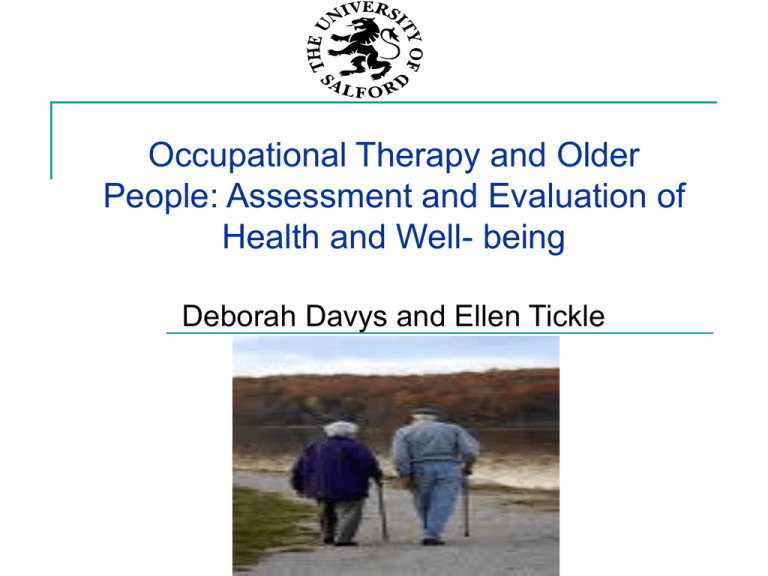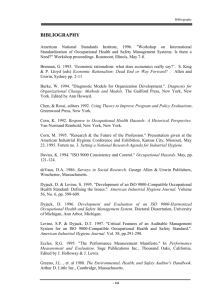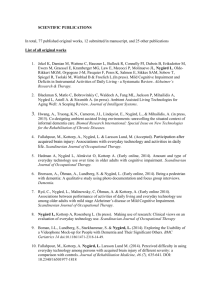Occupational Therapy and Older People: Assessment and
advertisement

Occupational Therapy and Older People: Assessment and Evaluation of Health and Well- being Deborah Davys and Ellen Tickle Session learning outcomes: Consider the role and background of occupational therapy regarding health and wellbeing in older people. Consider the evidence base for occupational therapy interventions with older people. Present a range of relevant assessment and evaluation tools. Older People: definitions, issues and context Issues – physical, psychological, social Statistical info UK government perspective –notable policies directly aimed at older people; NSF for Older People (2001) and Employment Equality (Age) Regulations (2006), Equality Act (2010) Definitions of health and well being According to WHO (2006) , healthy ageing is concerned with living a longer yet healthier life and relates to physical, social and mental health along with reduced levels of disability WHO (2001) suggests a major determinant of healthy ageing is living an independent life for as long as possible OT role re older people Core OT philosophy is related to : Occupation is fundamental to health and wellbeing People want to engage in occupations that are meaningful and purposeful to themselves as an individual People want to take control of and manage their own lives People want to be valued Evidence of efficacy of community OT with older people Steultjens et al (2004) carried out a systematic review related to the effectiveness of OT in in maintaining independent community living for older people aged 60 and above. Strong evidence for the efficacy of OT advising on equipment to improve functional ability. Some evidence for the effectiveness of OT in skills training alongside home safety assessment to reduce the incidence of falls in older people. Some evidence for the effectiveness of OT in improving functional ability, social participation and quality of life for older people. Insufficient evidence for OT interventions that involve counselling primary caregiver of dementia patients about maintaining patients functional abilities. Evidence for OT within mental health, well being and older people Graff et al 2007 Effects of Community OT on Quality of Life, Mood and Health Status of Dementia Patients and Their Caregivers: A Randomised Control Trial. Journal of Gerontology. Vol.62A, No 9 1002-1009. Sample - 135 community dwelling older people with mild to moderate dementia and their informal caregivers Intervention - 2 groups ; OT intervention group ( environmental modification, cognitive behavioural strategies, problem solving) and no OT intervention for 10 weeks. Outcome measures - Dementia Quality of Life Instrument, the Cornell Scale for Depression, Centre for Epidemiologic Studies Depression Scale, General Health Questionnaire 12 and Mastery Scale used with patients and their carers. Results - Overall Dementia Quality of Life was significantly better in the intervention group compared to the control group and significant 12 weeks post intervention. Evidence for OT in health promotion training for older people with visual difficulties Eklund et al (2008) A randomized control trial of a health promotion programme and its effect on ADL dependence and self-reported health problems for the elderly visually impaired. Scandinavian Journal of Occupational Therapy. Vol.15, pp68-74. Sample - 229 older people (65 years +) who have macular degeneration Intervention -Activity based health promotion programme compared to an individual programme- both led by OT`s Outcome measures – Functional tasks e.g. stairs, bath, dressing etc., SF-36 and self-rating scales for health issues such as coronary, vascular, musculoskeletal, psychological and fatigue issues. Results - The health promotion maintained their ADL independence level despite lowered visual acuity whilst individual intervention group increased dependence in ADL. Both groups lowered general health levels but the health promotion groups reported fewer health problemsmaintained at 28 months post intervention Evidence for OT regarding well being and life engagement for older people Horowitz and Chang (2004) Promoting well-being and engagement in life through occupational therapy lifestyle redesign. Topics in Geriatric Rehabilitation. Vol.20, No.1, pp46-58. Sample - 28 older people with a range of chronic conditions (depression, COPD, diabetes and spinal stenosis) Intervention - 16 week experimental group for lifestyle redesign( focused on daily routines, physical and mental activity, nutrition, medication, home and community safety and assistive technology) controlled with usual adult day programme. Outcome measures -Mini-Mental Status Exam, Functional Status Questionnaire, SF-36(V2), Centre for Epidemiological Studies Depression Scale, Life Satisfaction Index-Z Scale, and the Master Scale. Results -a favourable outcome for the experimental groups in relation to Role Functioning, Bodily Pain, General Health Survey SF-36,Social Activity on the Functional Status Questionnaire and Centre for Epidemiological Studies Depression Scale. Examples of tools used within research to assess and evaluate health and well being for older people (Graff et al 2007 Horowitz and Chang 2004, Clark et al 2001) Mini-Mental Status Exam, Functional Status Questionnaire, SF-36(V2), Centre for Epidemiological Studies Depression Scale, Life Satisfaction Index-Z Scale, Master Scale Dementia Quality of Life Instrument, Cornell Scale for Depression, General Health Questionnaire 12 References Clarke,F., Azen,S., Carlson,M. et al.(2001) Embedding health-promoting changes into the daily lives of independent-living older adults: long-term follow-up of occupational therapy intervention. The Journals of Gerontology Series B: Psychological Sciences and Social Sciences 56B (1):pp60-63. Eklund et al (2008) A randomized control trial of a health –promotion programme and its effect on ADL dependence and self-reported health problems for the elderly visually impaired. Scandinavian Journal of Occupational Therapy. Vol.15, pp68-74. Graff et al 2007 Effects of Community OT on Quality of Life, Mood and Health Status of Dementia Patients and Their Caregivers: A Randomised Control Trial. Journal of Gerontology. Vol.62A, No 9 10021009. Horowitz and Chang (2004) Promoting well-being and engagement in life through occupational therapy lifestyle redesign. Topics in Geriatric Rehabilitation. Vol.20, No.1, pp46-58. References continued: Steultjens , E.M.J., Dekker,J., Bouter,L.M., Jellema,S. et al (2004) Occupational therapy for community dwelling elderly people: a systematic review. Age and Ageing.Vol.33 No.5 pp 453-460. World Health Organisation – www.who.org Assessment web addresses Functional Status Questionnaire http://rangevoting.org/fun_status_question.pdf Mini Mental State Examination www.medicine.uiowa.edu/igec/tools/cognitive/MMSE.p df SPF-36v2 Health Survey http://www.dfwback.com/pdfs/SF36HealthSurvey.pdf Range of rating scale examples http://counsellingresource.com Life satisfaction - http://www.gesher.org/MyersBriggs/life_satis_index.html







